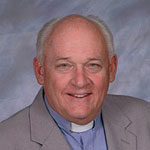
This past year was an up and down year for many of us. Whether we agree or disagree with the present policies of our country, one thing we can agree on is the importance of our families.
When we speak of family life today, having a single idea of what a family looks like is difficult. In the U.S. 31 percent of families have less than two parents. Also when speaking of the family, different emotions surface – joy, thankfulness, sadness, pain, anger, disappointment.
A story from 15th century Germany can help us see the value of each family member. In the city of Weinsberg, Germany, an ancient fortress stands on the very top of the hill overlooking the city. The townspeople of Weinsberg tell an interesting story about that fortress and that hill.
In the days of chivalry and honor, an enemy encircled that hill and sealed all the townspeople inside the fortress. The enemy commander sent word up to the fortress, saying that he would allow the women and children to go free before he launched his devastating attack. After further negotiations the enemy commander also agreed, on his word of honor, to let each woman take with her, the most valuable possession she owned, provided she could carry it.
You can imagine the enemy army’s anxiety and surprise when, a few minutes later, the women marched out of the fortress, each carrying her husband on her back! Our family members are our most valuable possessions.
When Mary and Joseph return to Jerusalem to look for Jesus, they are surprised to find him sitting with the doctors and asking them questions. When they express their worry and anxiety, Jesus replies that he must be about God’s affairs. Mary and Joseph do not understand what Jesus means. Misunderstandings occurred in Jesus’ family. This can be reassuring when it happens in of our own families.
Misunderstanding causes pain and confusion. Many older parents find it difficult to accept the choices that their adult children make. In particular, they struggle when their adult children no longer go to Church, profess their faith or choose alternative lifestyles.
To love is to continue to accept the other person, even if their choices are hard to accept. To love requires giving freedom that is appropriate to age and maturity. This balance is difficult to achieve. The task of parenting is to nurture this maturity.
For any parent, letting go is difficult. To let go does not mean to stop caring; it means I cannot do it for someone else. To let go is not to cut myself off. It’s the realization that I cannot control another. To let go is not to enable, but to allow learning from natural consequences.
To let go is to admit powerlessness, which means the outcome is not in my hands. To let go is not to try to change or blame another; I can only change myself. To let go is not to fix, but to be supportive.
To let go is not to judge, but to allow another to be a human being. To let go is not to be in the middle arranging all the outcomes, but to allow others to effect their own outcomes. To let go is not to be protective; it’s to permit another to face reality. To let go is not to deny, but to accept.
To let go is not to nag, scold, or argue, but to search out my own shortcomings and to correct them. To let go is not to adjust everything to my desires, but to take each day as it comes. To let go is not to criticize and regulate anyone, but to try to become what I dream I can be. To let go is not to regret the past, but to grow and live for the future. To let go is to fear less and love more.
The family is a place where we love each other far beyond our merits. Loving like this and being accepted like this, helps us to see our own worth and value. It produces more family happiness and joy than can be found anywhere else.


Be the first to comment